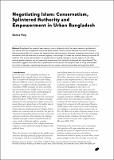| dc.contributor.author | Huq, Samia | en |
| dc.date.accessioned | 2016-01-11T15:55:38Z | |
| dc.date.available | 2016-01-11T15:55:38Z | |
| dc.date.issued | 01/03/2010 | en |
| dc.identifier.citation | Huq, S. (2010) Negotiating Islam: Conservatism, Splintered Authority and Empowerment in Urban Bangladesh. IDS Bulletin 41(2): 97-105 | en |
| dc.identifier.issn | 1759-5436 | en |
| dc.identifier.uri | https://opendocs.ids.ac.uk/opendocs/handle/20.500.12413/7804 | |
| dc.description.abstract | Bangladesh has recently been seeing a rise in religiosity which has been treated as problematic, anti?secular and anti?progressive within the public sphere. Various writers describe this trend as having a disempowering effect on women and negating their self?expression. However, underlying these views is the assumption that the assertion of women's agency is not enough if it does not confront existing structures of relations. This article asks whether it is possible that in seeking changes in certain aspects of one's life, existing gender relations are not necessarily transformed, but indirectly challenged and reconfigured? The conclusion suggests that rather than a polarisation of the secular and religious ways of living most people are in fact in between, negotiating between the two camps, and borrowing ideas and ways from both. | en |
| dc.format.extent | 9 | en |
| dc.publisher | Blackwell Publishing Ltd | en |
| dc.relation.ispartofseries | IDS Bulletin Vol. 41 Nos. 2 | en |
| dc.rights.uri | http://www.ids.ac.uk/files/dmfile/IDSOpenDocsStandardTermsOfUse.pdf | en |
| dc.title | Negotiating Islam: Conservatism, Splintered Authority and Empowerment in Urban Bangladesh | en |
| dc.type | Article | en |
| dc.rights.holder | © 2010 The Author. Journal compilation © Institute of Development Studies | en |
| dc.identifier.doi | 10.1111/j.1759-5436.2010.00128.x | en |

